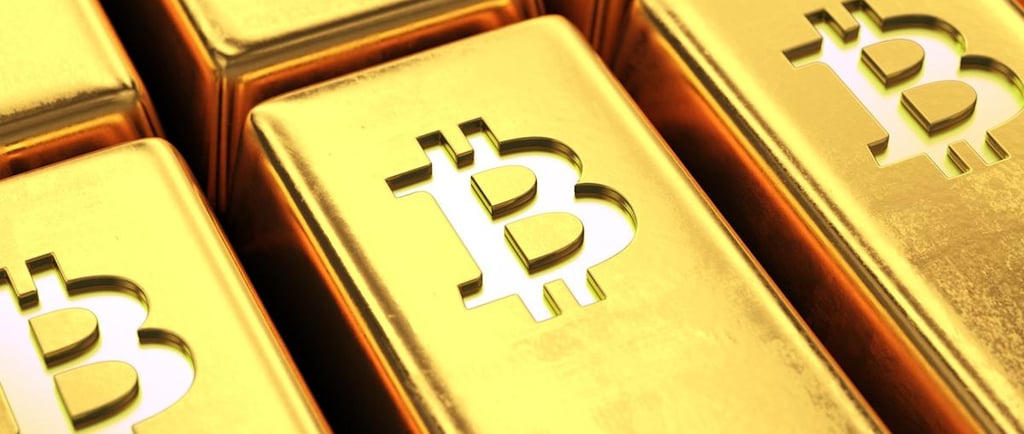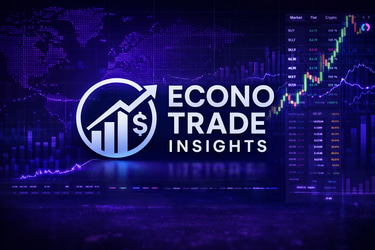Why Bitcoin is Often Referred to as Digital Gold: Exploring the Similarities and Differences
7/21/20255 min read


Understanding the Concept of Digital Gold
The term "digital gold" has recently become synonymous with Bitcoin among investors and analysts. This evolving perception stems from a multifaceted understanding of gold's historical role as a store of value and the characteristics that Bitcoin shares with this long-standing precious metal. Gold has been a cornerstone of wealth preservation for centuries, demonstrating remarkable durability and value retention despite economic fluctuations. Its tangible nature and scarcity have solidified its status in global finance, making it a reliable refuge in times of economic uncertainty.
Bitcoin, introduced in 2009, emerged as a decentralized digital currency designed to operate independently of central banks. Its framework is built upon blockchain technology, which ensures transparency and security through a distributed ledger system. One of the primary reasons Bitcoin is likened to gold is its limited supply. Just as gold extraction becomes increasingly difficult, capped at 21 million coins, Bitcoin's issuance is programmed to diminish over time through a process known as halving. This inherent scarcity adds a layer of value, positioning Bitcoin as a reliable asset for both investors and individuals seeking protection against inflation.
Moreover, the characteristics of portability and divisibility contribute to the economic appeal of Bitcoin as digital gold. Unlike physical gold, which can be cumbersome to transport and divide, Bitcoin allows for seamless transactions and fractional ownership, making it accessible for a broader audience. This flexibility enhances its utility as a medium of exchange and a store of value in the digital era. By merging these essential attributes, Bitcoin serves not only as an investment vehicle but also as a potential hedge against the systemic risks present in today's financial landscape.
Key Differences Between Bitcoin and Gold
Bitcoin and gold are often compared due to their status as perceived stores of value, yet they exhibit distinct characteristics that cater to different investment strategies and risks. The most notable difference is their physical form. Gold is a tangible asset, often found in jewelry, coins, and bars, which gives it intrinsic value rooted in its material properties. In contrast, Bitcoin exists solely in a digital format, governed by complex algorithms and stored on a decentralized network called the blockchain. This fundamental difference underpins many of the other variations between the two.
Market accessibility is another significant differentiator. Gold has been traded for thousands of years, making it a well-established commodity with a myriad of marketplaces, including exchanges and online retailers. Conversely, Bitcoin, launched only in 2009, operates in a relatively new sphere of cryptocurrency exchanges, which can be perceived as less stable. While both assets can be accessed globally, Bitcoin's digital nature enables 24/7 trading, contrasting the limited hours of traditional gold markets.
Volatility is a critical framework in evaluating Bitcoin and gold. Bitcoin's price is notoriously volatile, with significant price swings occurring within short time frames. This volatility can lead to substantial returns but also severe losses, making it suitable primarily for risk-tolerant investors. In comparison, gold typically demonstrates lower volatility and has historically served as a safe-haven asset during economic downturns. Investors often turn to gold during inflation or geopolitical uncertainties, making it a more stable, albeit slower-growing, investment.
Lastly, regulatory environments surrounding each asset are diverging. Gold is subject to extensive regulatory oversight, including rules related to mining and trading. Bitcoin, while encountering increasing scrutiny and regulation, remains in a comparatively fluid legal space, driving innovation but also creating uncertainty for many potential investors. Such differences present unique advantages and challenges for those considering investing in Bitcoin versus traditional gold.
Similarities That Bind Bitcoin and Gold
Bitcoin and gold, despite their differing forms and functions, share several key attributes that have led to the common characterization of Bitcoin as "digital gold." One of the primary similarities lies in their role as safe-haven assets. In times of economic instability, both Bitcoin and gold have historically been sought after by investors looking to preserve their wealth. This perception is rooted in their ability to retain value when traditional currencies fluctuate or lose purchasing power, thus providing a sense of security during turbulent financial periods.
An essential aspect of both Bitcoin and gold is their scarcity. Gold is a finite resource, with mining becoming more challenging as existing reserves are depleted. Similarly, Bitcoin operates on a capped supply cap of 21 million coins, which is hardwired into its protocol. This inherent scarcity plays a crucial role in driving demand and value, as both assets cannot be created at will like fiat currencies. As investors become increasingly aware of this limitation, their interest in both gold and Bitcoin as stores of value continues to grow.
Another point of convergence is how both assets are viewed as hedges against economic uncertainty. Gold has long been established in this capacity, often being purchased at times of market instability or inflation. Bitcoin, while a newer asset class, has increasingly been treated by investors as a digital counterpart, representing an innovative and decentralized alternative to traditional investment vehicles. The psychological factors that influence their valuations are also similar; both assets attract investors based on the perceived security they offer and the instinct to safeguard wealth in the face of impending financial downturns. Consequently, these parallels underscore why Bitcoin is often referred to as digital gold in the realm of finance.
The Rise of Global Bitcoin Adoption
In recent years, Bitcoin has experienced a remarkable rise in global adoption, signaling its transition from a niche digital currency to a widely recognized asset class. This evolution is evident in various sectors, including finance, retail, and even real estate. A thriving ecosystem of service providers and platforms has emerged, facilitating the use of Bitcoin for transactions, investments, and savings. The expanding list of merchants accepting Bitcoin as payment is reshaping commerce and driving consumer interest. Notably, major companies have begun integrating Bitcoin into their payment systems, further legitimizing its role in everyday transactions.
Demographic shifts also play a significant role in Bitcoin's adoption. Younger generations, particularly Millennials and Gen Z, are leading the charge, often viewing Bitcoin as a hedge against inflation and traditional investment vehicles. This demographic is characterized by a tech-savvy approach to finance, leaning towards digital solutions that offer convenience and security. Additionally, surveys indicate that a growing number of older investors are also recognizing Bitcoin’s potential, leading to a more diverse investor base enriched by varying financial perspectives.
On the regulatory front, governments and financial institutions worldwide are beginning to navigate the complexities of Bitcoin and other cryptocurrencies. Many countries have established frameworks aimed at fostering innovation while ensuring consumer protection and market stability. Institutional investments in Bitcoin have surged, with major financial firms acknowledging its potential as a store of value akin to gold. This integration into traditional finance is indicative of a broader acceptance and recognition of Bitcoin's importance in the global economy.
As Bitcoin continues to gain traction as a mainstream asset, its status as “digital gold” becomes increasingly relevant. For those interested in exploring Bitcoin investment opportunities, it is essential to approach this digital asset with informed decision-making. Consider visiting GO AI-ACADEMY, your gateway into the world of trading and investing, to learn more and get started on your Bitcoin journey.
EconoTrade Insights
Learn. Trade. Grow.
Empowering financial freedom through smart education and trusted tools.
© 2025 ECONO TRADE INSIGHTS. All rights reserved.
About - https://econotradeinsights.com/about-us-financial-blogging
Contact - econotradeinsights@gmail.com
Disclaimer - https://econotradeinsights.com/disclaimer
Terms & Conditions - https://econotradeinsights.com/terms-and-conditions
